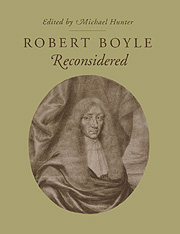Book contents
- Frontmatter
- Contents
- List of contributors
- List of abbreviations
- Preface
- 1 Introduction
- 2 Virtue, providence and political neutralism: Boyle and Interregnum politics
- 3 Science writing and writing science: Boyle and rhetorical theory
- 4 Learning from experience: Boyle's construction of an experimental philosophy
- 5 Carneades and the chemists: a study of The Sceptical Chymist and its impact on seventeenth-century chemistry
- 6 Boyle's alchemical pursuits
- 7 Boyle's debt to corpuscular alchemy
- 8 Boyle and cosmical qualities
- 9 The theological context of Boyle's Things above Reason
- 10 ‘Parcere nominibus’: Boyle, Hooke and the rhetorical interpretation of Descartes
- 11 Teleological reasoning in Boyle's Disquisition about Final Causes
- 12 Locke and Boyle on miracles and God's existence
- Bibliography of writings on Boyle published since 1940
- Index
3 - Science writing and writing science: Boyle and rhetorical theory
Published online by Cambridge University Press: 03 December 2009
- Frontmatter
- Contents
- List of contributors
- List of abbreviations
- Preface
- 1 Introduction
- 2 Virtue, providence and political neutralism: Boyle and Interregnum politics
- 3 Science writing and writing science: Boyle and rhetorical theory
- 4 Learning from experience: Boyle's construction of an experimental philosophy
- 5 Carneades and the chemists: a study of The Sceptical Chymist and its impact on seventeenth-century chemistry
- 6 Boyle's alchemical pursuits
- 7 Boyle's debt to corpuscular alchemy
- 8 Boyle and cosmical qualities
- 9 The theological context of Boyle's Things above Reason
- 10 ‘Parcere nominibus’: Boyle, Hooke and the rhetorical interpretation of Descartes
- 11 Teleological reasoning in Boyle's Disquisition about Final Causes
- 12 Locke and Boyle on miracles and God's existence
- Bibliography of writings on Boyle published since 1940
- Index
Summary
But I think it will be convenient to make the very first words of the English account itself I sent you, to be preceded by a long stroke in the same line, to intimate that the letter did not begin there; lest, without such intimation, the beginning may appear either too abrupt, or not so civil to you, as I desire my writings should be thought, as well as be.
But besides the unintentional deficiencies of my style, I have knowingly and purposely transgressed the laws of oratory in one particular, namely in making sometimes my periods or parentheses over-long: … I chose rather to neglect the precepts of rhetoricians, than the mention of those things, which I thought pertinent to my subject, and useful to you, my reader.
The tercentenary of Robert Boyle's death was commemorated by historians and philosophers of science, not by literary scholars. Since an important dimension of Boyle's career was literary, such neglect is surprising. Part of the reason for this neglect may be the textual and bibliographical limitations of the Birch edition, which makes Boyle seem like a writer of the mid-eighteenth century rather than a contemporary of Sir Thomas Browne, John Milton and John Dryden.
- Type
- Chapter
- Information
- Robert Boyle Reconsidered , pp. 37 - 56Publisher: Cambridge University PressPrint publication year: 1994
- 5
- Cited by

